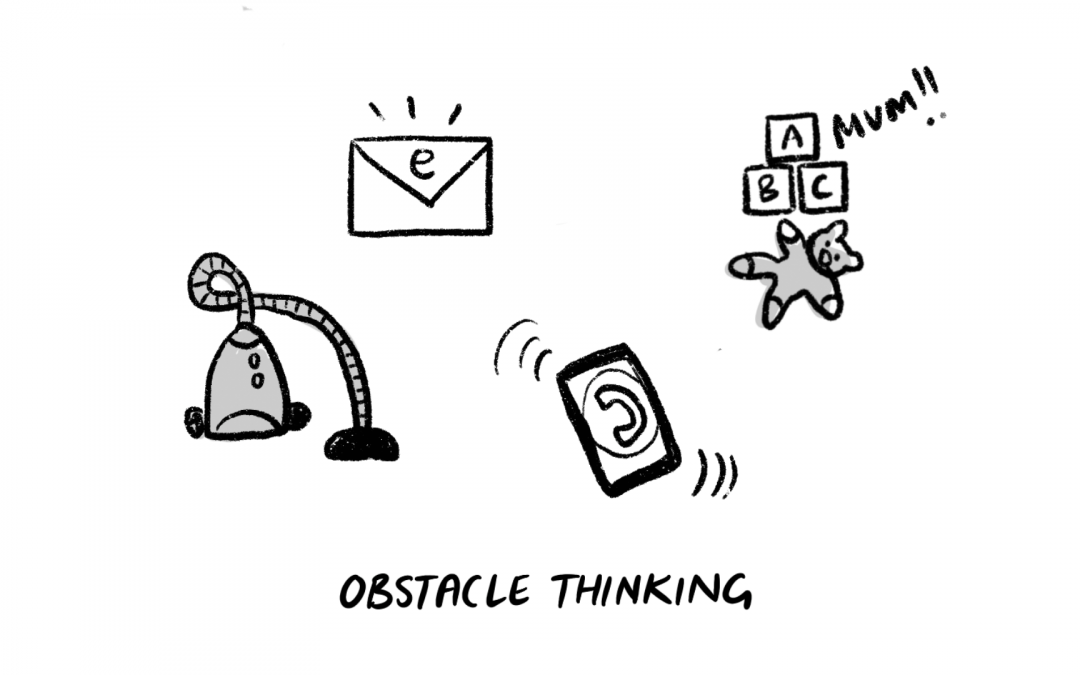Many things get in the way of writing – from the siren call of social media to children clamouring for attention. Find out what obstacles writers face and how to battle your distraction with obstacle thinking. Learn to WOOP with some help from video games.
The time is right, I’m primed and ready for action. My mission is clear. It’s what I’m trained for. All I have to do is bungee jump from the dam, infiltrate the secret chemical weapons facility, and save the world from global financial meltdown.
My first attempt at playing the classic Nintendo 64 game GoldenEye 007 did not start well. I barely got to the second bar of the iconic James Bond soundtrack before one of the baddies took me out. But, now I knew where they were hiding, I could strike first and prepare for the next barrage of bullets.
Research shows that video games can teach us valuable lessons about achieving goals. While the skills involved in battling balaclava-clad machine-gun shooters might be different from those needed to avoid the temptations of Twitter, there are similarities in how you tackle them.
Identify the bad guys
“Bad guys in everyday life work just the same way, they make things tougher on us,” wrote Jane McGonigal, games designer and director of research at the Institute for the Future. “But in making it harder for us to achieve our goals, bad guys also help us to develop skills and strategies that ultimately maker us smarter, stronger and faster – so we can achieve bigger goals in the future.”
>> Read more: How to set a writing goal: the ultimate guide
McGonigal knows a thing or two about baddies. When severe concussion left her bedridden and suicidal she used gaming to help her recover. Once healed, she dug into the research and created Super Better, a multi-player game that boosts resilience. Her Ted Talks and book share her journey and advice on how we can all use games to live better – and longer – lives.
“in making it harder for us to achieve our goals, bad guys also help us to develop skills and strategies that ultimately maker us smarter, stronger and faster.” Jane McGonigal
But before we can live our best lives, we need to get to grips with our baddies, as McGonigal says: “Once you’re fully aware of your bad guys, you can work towards developing multiple strategies for dealing with them.”
The baddies that stop us writing
Writers’ distractions and procrastination activities are as creative as their penmanship. Over the years working with writers at Prolifiko, we’ve come across many weird and wonderful examples of what stops people writing. As part of our coaching and courses, we ask people to get specific on what will get in the way of their writing plans.
I analysed a sample of 500 blocks and barriers that people faced over the last few months. It will come as no surprise that work featured in over half of the responses (54%).
The siren call of social media ranked highly, with 20% placing the blame on their mobile phones, 16% of writers identifying specific platforms, and 10% calling out the news (an additional 4% named the Coronavirus).
Family and housework featured highly. 16% of writers cited their family as pulling them away from their writing (I’m not sure of the significance of this, but husbands are more distracting than wives and daughters more distracting than sons…). Household chores were named by 9%.
All of these are external blocks, tangible things that stop people writing. The other category of writing baddies are psychological with 37% of writers listing internal blockers. Fear, overwhelm, anxiety or negative thoughts, perfectionism and loss of confidence were all significant enough to stop people putting pen to paper.
Negative language peppered the responses, with words like ‘urgent’, ‘emergency’, ‘interruptions’, ‘obstacles’ and ‘blocks’ mentioned repeatedly, along with feeling ‘tired’ or ‘exhausted’. I don’t know about you, but I’m feel pretty drained by all these blockers.
What stops writers writing
- Work 54%
- Negative thinking 37%
- Social media 20%
- Family 16%
- The news 10%
- Household chores 9%
Overcoming baddies with WOOP
Spotting baddies is helpful, but not enough. Much like my rookie James Bond in the GoldenEye game I need to do more than scream ‘shooter!’ I need to fight back. That means putting in place tactics to overcome whatever blocks I face.
Mental Contrasting is a psychological principle that involves focusing on the contrast between the positive aspects of our goals (eg write a bestselling book) and the negative aspects of our obstacles or current situation (eg home schooling during the pandemic).
Research by Gabriele Oettingen, professor of psychology at New York University and the University of Hamburg, offers an approach. She investigated the gap between expectations versus fantasies of future success and found that how we think about future impacts our effort and the eventual outcome. Oettingen created behaviour change interventions that can help turn fantasies into reality. In research terms, she combined ‘Mental Contrasting’ with ‘Implementation Intentions’ to create a planning strategy called WOOP.
WOOP – turning wishes into plans
WOOP is an acronym that stands for Wish, Outcome, Obstacle and Plan. It sounds like a victory cheer and rightly so, any psychological exercise that makes our wishes more likely to happen deserves a shout-out-loud name. This handy mnemonic prompts responses, as follows:
- W – name a wish that is challenging, but feasible.
- O – find the very best outcome and visualise it.
- O – identify your main obstacle and imagine this fully.
- P – make a plan of how to overcome the obstacle.
Oettingen has created a set of guided exercises on the website www.woopmylife.org and explores the research in her book Rethinking Positive Thinking: Inside the New Science of Motivation.
In her example exercise, Oettingen suggests thinking of a 4-week timeframe. However, WOOP works on both short-term wishes as well as long-term goals.
How to apply WOOP to writing distractions
If you are struggling to WOOP – start small. Think ahead to your next writing session, imagine what you want to achieve, such as hitting a 500 word target or concentrating on your project for 45 minutes. Then be specific about what will get in the way – is it the siren call of social media or children screaming for attention? Finally, imagine ways to tackle these obstacles, for example:
- If I need to do more research, then I’ll make a note on my document instead of going into an internet rabbit hole.
- When the children need attention, I’ll ask my partner to help while I’m writing.
The ‘if/when-then’ mental model is great for getting specific on your implementation plans. To find out more on this approach, read: The persuasive power of ‘when – then’ planning to make you a more productive writer.
Multiple strategies
I’m sure that pandemic home-schoolers are rolling their eyes at my optimistic plan to delegate demanding children to an equally over-burdened partner. Don’t rely on my suggestion but generate your own solutions. And, if you want to have a good idea, research shows you are more likely to have a good one if you have several to choose from.
>> Read more: How small steps lead to great progress
The key to making plans work is to generate several ideas of how to overcome obstacles, then experiment to find out which one works best. “Having multiple strategies makes you much more resilient to setbacks,” wrote Jane McGonigal.
“When a bad guy takes you by surprise, or when multiple bad guys gang up on you at the same time, you’ll be much more agile and flexible in your response. And if one strategy doesn’t work, you’re less likely to give up entirely. You’ll simply pay attention, change your strategy, and keep trying to make progress.” Jane McGonigal
Brainstorm multiple solutions, test them out and evaluate those experiments. If the tactic works – add it to your writing routine; if it fails – chuck it.
Keeping an experimental mindset prevents judgement and ruminating over failed tactics. After all, you haven’t failed, just that approach has, so learn from the experience and try something else. Doing this in small steps means you figure out what works – fast.
>> Read more: A guide to tracking your writing – why noticing how you write will transform your practice
Start now
Going through the obstacles that writers face showed me that we face blocks every single day. There are baddies lurking round every corner.
There is no such thing as the perfect time or place to write. So start now.
Pay attention to what stops you writing. Put in place plans to overcome those obstacles. Make progress towards your wishes today.




